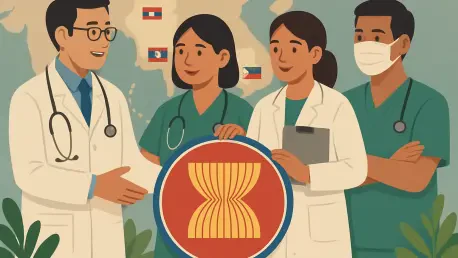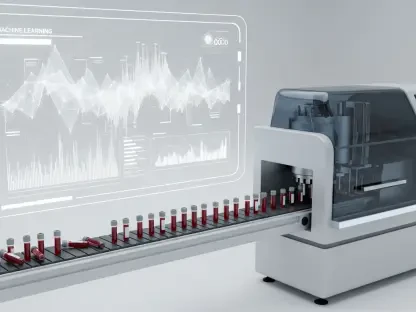In a landmark effort to strengthen health security across Southeast Asia, Australia and Thailand have embarked on a transformative partnership that promises to reshape the region’s approach to public health, bringing new hope for resilience. Announced on August 11, this collaboration brings together Australia’s Commonwealth Scientific and Industrial Research Organisation (CSIRO) and Thai government agencies to enhance Thailand’s ability to produce vital medicines domestically. Supported by the Australian Government’s Partnerships for a Healthy Region initiative, the project targets critical challenges like HIV and cancer, while laying the groundwork for a robust biotech sector in the ASEAN region. This initiative is more than a bilateral agreement; it represents a shared commitment to resilience, addressing vulnerabilities exposed by past global health crises. By fostering self-reliance in pharmaceutical production, the partnership aims to ensure affordable access to treatments and inspire similar efforts across neighboring countries, creating a ripple effect of improved health outcomes and regional stability.
Empowering Through Knowledge Exchange
A cornerstone of this collaboration is the intensive training provided to Thai professionals at CSIRO’s cutting-edge facilities in Clayton, Melbourne. Eleven representatives from various Thai government agencies, ranging from research technicians to institute directors, participated in a program designed to elevate their expertise in biomedical manufacturing. The curriculum focused on scaling up production and optimizing processes, equipping participants with practical skills to implement back home. Exposure to advanced methodologies offered a glimpse into the future of pharmaceutical development, ensuring that Thailand can meet its health needs with greater efficiency. This hands-on experience is poised to have a lasting impact, as these professionals return with not just technical knowledge but also a renewed vision for innovation in their field, ready to tackle the unique challenges faced by their nation’s health sector with newfound confidence and capability.
Beyond the technical aspects, the training fostered a deep sense of camaraderie and mutual learning between Australian and Thai counterparts. Participants frequently highlighted the collaborative environment at CSIRO, noting how the emphasis on teamwork provided valuable lessons in lab management and interdisciplinary cooperation. This exchange of ideas transcended mere skill-building, creating a network of professionals united by a common goal of improving health outcomes. The relationships built during this program are expected to pave the way for ongoing dialogue and joint projects, reinforcing the bonds between the two nations. Such cultural and professional synergy underscores the broader aim of the initiative: to build a foundation of trust and shared purpose that can support future endeavors in the region, ensuring that health security is not just a national priority but a collective regional strength.
Tackling Pressing Health Priorities
One of the primary motivations behind this partnership is the urgent need to address Thailand’s significant health challenges, particularly in the areas of HIV and cancer. Despite notable progress in managing HIV, the country still falls short of international treatment and suppression targets, leaving many without adequate care. The local production of antiretrovirals through this initiative offers a promising solution, aiming to close these gaps by ensuring a consistent and cost-effective supply of medication. By reducing dependence on imported drugs, Thailand can better control distribution and accessibility, directly benefiting vulnerable populations. This targeted approach not only addresses immediate public health needs but also sets a precedent for handling other chronic conditions with locally manufactured treatments, enhancing overall health equity across diverse communities.
In parallel, the rising incidence of cancer presents another critical focus for this collaboration. Projections indicate a sharp increase in cases over the coming decades, placing immense pressure on existing healthcare systems. The ability to produce cancer biotherapeutics domestically is seen as a transformative step, mitigating the burden of high costs and supply chain disruptions often associated with imported therapies. This initiative empowers Thailand to build a more responsive and sustainable framework for cancer care, ensuring patients receive timely interventions. Moreover, the focus on these two major health issues highlights the strategic alignment of the partnership with Thailand’s most pressing needs, demonstrating a tailored approach to capacity building that prioritizes real-world impact over generic solutions, and fosters hope for a healthier future for millions.
Leveraging Cutting-Edge Innovations
Central to the success of this partnership is the integration of advanced technologies that redefine pharmaceutical manufacturing. At CSIRO’s National Vaccine and Therapeutics Laboratory, Thai professionals gained firsthand exposure to state-of-the-art tools, with flow chemistry emerging as a standout innovation. This method, known for its efficiency, safety, and reduced environmental footprint, offers a cleaner alternative to traditional production techniques. By adopting such forward-thinking practices, Thailand stands to modernize its biomedical sector, cutting down on waste and energy costs while meeting the growing demand for essential medicines. The introduction of these technologies represents a leap forward, positioning the country to not only address current health demands but also anticipate future needs with agile and sustainable solutions.
The significance of this technological transfer extends beyond immediate applications, inspiring a broader shift toward innovation-driven healthcare in Thailand. Participants in the training program expressed enthusiasm for the potential to replicate these advanced systems in their own facilities, recognizing the long-term benefits of such modernization. This exposure serves as a catalyst for systemic change, encouraging investment in infrastructure and research that can support a cutting-edge biotech industry. Additionally, the adoption of these methods aligns with global trends toward greener and more efficient manufacturing, ensuring that Thailand’s health sector remains competitive on an international stage. This focus on innovation underscores the partnership’s forward-looking vision, aiming to equip the nation with the tools needed to navigate an ever-evolving landscape of health challenges.
Fostering Regional Resilience and Growth
The implications of this collaboration reach far beyond Thailand’s borders, aiming to create a blueprint for health security across the ASEAN region. By supporting the development of a sustainable biotech industry, the initiative integrates pharmaceutical manufacturing into local economies, driving job creation and economic growth. This economic dimension complements the health benefits, as a thriving industry can fund further advancements in medical research and infrastructure. The partnership also strengthens health systems to better prepare for emergencies, reducing the risk of supply shortages during crises. Such preparedness is vital in a region prone to diverse health threats, ensuring that ASEAN countries can respond swiftly and effectively to future challenges while maintaining stability and public trust in their healthcare capabilities.
Equally important is the strategic value of regional cooperation highlighted by this endeavor. A healthier ASEAN benefits Australia through shared resilience, as stronger neighbors contribute to collective security against global health risks. This initiative reflects a commitment to equitable access to medicines, reinforcing the idea that health is a shared responsibility rather than a national concern alone. The success of this model could encourage similar collaborations with other ASEAN nations, amplifying the impact of localized efforts into a cohesive regional strategy. By investing in Thailand’s capacity, Australia sets a powerful example of how partnerships can address systemic vulnerabilities, fostering a network of mutual support that enhances the well-being of millions while securing a more stable and prosperous future for the entire region.
Reflecting on a Path Forward
Looking back, the partnership between Australia and Thailand marked a pivotal moment in the journey toward enhanced ASEAN health security. The training provided to Thai professionals at CSIRO’s facilities laid a solid foundation for innovation, equipping them with the skills to transform domestic pharmaceutical production. The focus on critical areas like HIV and cancer addressed immediate needs, while the adoption of advanced technologies like flow chemistry signaled a shift toward sustainable practices. As the initiative unfolded, it became clear that the benefits extended beyond health, spurring economic growth and regional preparedness. Moving forward, the emphasis should remain on scaling these efforts, encouraging other ASEAN nations to adopt similar models of collaboration. Expanding funding and knowledge-sharing platforms will be key to sustaining momentum, ensuring that the legacy of this partnership continues to inspire resilience and equity in health systems across the region for years to come.









